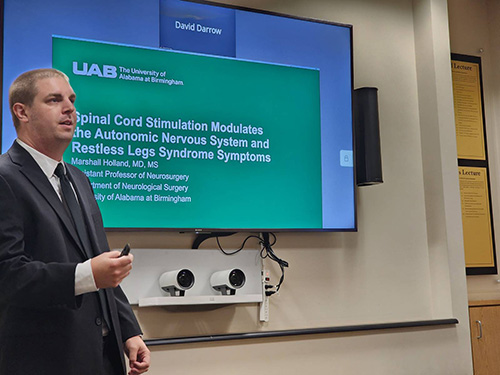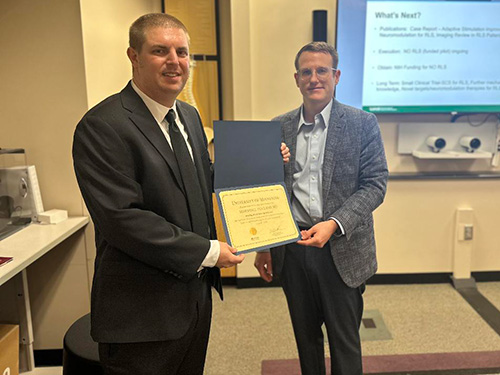Marshall Holland, M.D., MS, assistant professor in the University of Alabama at Birmingham Department of Neurosurgery, recently served as a visiting professor at the University of Minnesota Department of Neurosurgery, where he delivered a grand rounds lecture on a novel application of spinal cord stimulation for modulation of the autonomic nervous system and restless legs syndrome (RLS).
RLS is a neurological condition marked by an uncontrollable urge to move the legs, especially during the evening or nighttime. It affects an estimated 5 to 15 percent of the population and Holland noted that for patients with RLS, the impact of the disease is significant. RLS can severely disrupt sleep, leading to a 40% increased risk of morbidity from heart disease, stroke and obesity.
Current treatments include iron replacement and peripheral nerve medications such as gabapentin, which can be effective initially but often lose effectiveness over time. Long-term use of these medications often requires increasing dosages that can lead to side effects such as cognitive fog or imbalance.
Holland’s research into spinal cord stimulation as an alternative treatment began during his residency, when a patient who had a stimulator implanted for chronic pain reported a dramatic and unexpected improvement in his RLS symptoms. The patient’s score on the International Restless Legs Syndrome Scale, which ranges from 0 to 40, dropped from a severe 33 to zero. After more than two years of observing the patient, Holland and his colleagues published a case report, which has been followed by a growing number of additional reports by other centers supporting their initial findings.

Holland believes the results may involve the autonomic nervous system, with spinal cord stimulation reducing sympathetic tone and increasing blood flow to the lower extremities—both of which may alleviate RLS symptoms. Follow up research also showed a temporary drop in blood pressure in some patients after implantation, suggesting broader effects on the nervous system.
Looking forward, Holland’s research is focused on understanding the underlying electrophysiology of RLS and the effects of spinal cord stimulation. Some studies suggest that patients with RLS have increased excitability in areas of the brain such as the sensory and motor cortex. Holland hypothesizes that RLS is a network dysfunction rather than a localized disorder—an insight that could pave the way for more targeted neuromodulation therapies.
